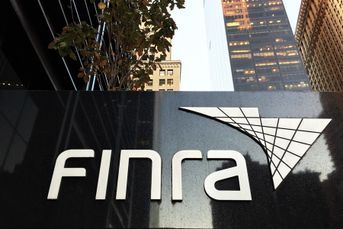Goldman case brings renewed hope in fiduciary-reform fight
The SEC charges of fraud against Goldman Sachs & Co. are giving renewed hope to financial advisers who want the fiduciary standard included in financial-reform legislation pending in Congress.
The SEC charges of fraud against Goldman Sachs & Co. are giving renewed hope to financial advisers who want the fiduciary standard included in financial-reform legislation pending in Congress.
In essence, the charges against Goldman and an institutional broker, Fabrice Tourre, paint a vivid picture of the harm that a broker who relies on the suitability standard when selling a product can inflict on a client, said Knut Rostad, who belongs to The Committee for the Fiduciary Standard.
“We have been visiting Senate staff, making a case that the fiduciary-standard amendment is important, and we’ve been holding up Goldman Sachs” as an example for the brokerage business, he said.
The Securities and Exchange Commission’s lawsuit against Goldman “is a stark reminder of the differences” between the fiduciary and suitability, or “fair-dealing,” standards, said Blaine F. Aikin, who is a member of the group as well as chief executive of fi360, a consulting group, and a blogger for Investment-News.com.
The SEC’s lawsuit against Goldman shows that the securities industry at times will adhere to the lowest standards possible when selling products to clients, said Mr. Rostad, who is also a regulatory and compliance officer at Rembert Pendleton Jackson.
“In broad terms, the Goldman Sachs allegations help provide some wider political support for regulatory reform,” said David Tittsworth, executive director of the Investment Adviser Association, which is a proponent of the fiduciary standard. “A steady drumbeat of allegations and cases does certainly add to the perception that Wall Street was not doing its job, and certainly not protecting the little guy.”
In its lawsuit, the SEC charged that Goldman made “materially misleading statements and omissions” in connection to the sale of a $1 billion synthetic collateralized debt obligation to institutional clients in 2007.
“Undisclosed in the marketing materials and unbeknownst to investors, a large hedge fund, Paulson & Co. Inc., with economic interests directly adverse to investors in the [CDO investment fund] played a significant role in the portfolio selection process,” the SEC charged.
Goldman officials said that the SEC’s charges are unfounded and that the firm will vigorously defend itself and its reputation, noting that it lost $90 million on the fund.
Last week, the firm suspended Mr. Tourre. He and Goldman chief executive Lloyd Blankfein will testify before Congress on Tuesday, according to published reports.
Mr. Blankfein has made a number of public statements in which he emphasized that Goldman doesn’t take a fiduciary role when it sells products.
In testimony before the Financial Crisis Inquiry Commission in mid-January, he said: “In our market-making function, we are a principal. We represent the other side of what people want to do. We are not a fiduciary. We are not an agent. Of course, we have an obligation to fully disclose what an instrument is and to be honest in our dealings, but we are not managing somebody else’s money.”
Federal law requires registered investment advisers to adhere to a fiduciary standard mandated by the Investment Advisers Act of 1940 in which they are required to put the client’s best interests before their own.
Stockbrokers who are registered with the Financial Industry Regulatory Authority Inc. adhere to a far different standard, one that requires them to ensure that the products and investments they recommend be suitable for clients. The broker selling the product is also supposed to use due diligence to learn the essential facts relating to the customer and investor.
An expanding trend in the retail securities business is for sales representatives to work as both advisers and brokers.
Still the number of registered brokers overwhelms the number of advisers. There are about 23,000 advisers registered with the states and the SEC.
Finra has 634,000 registered brokers.
The inclusion of the fiduciary standard in financial-reform legislation appeared all but dead last month.
The financial-reform package introduced in March by Senate Banking Committee Chairman Christopher Dodd, D-Conn., dropped an earlier provision that would have imposed a fiduciary duty on anyone offering advice on investments, dealing a blow to those who support the standard.
The Dodd bill instead called for a one-year SEC study of the issues surrounding adviser and broker-dealer oversight.
Two senators, Daniel Akaka, D-Hawaii, and Robert Menendez, D-N.J., wrote an amendment to that bill that would reintroduce the fiduciary standard. The proposal for a study would be replaced with a provision that would authorize the SEC to adopt rules requiring broker-dealers providing advice to comply with the fiduciary standard. If enacted, the amendment would bring the Senate bill in line with the financial-reform bill approved by the House of Representatives in December.
“Imposing a fiduciary duty on brokers is necessary because it will ensure that all financial professionals, whether they are an investment adviser or a broker, have the same responsibility to act in the best interests of their clients,” Mr. Akaka said.
He said he plans to file the amendment, but it has not been determined which amendments will be offered on the floor.
The minimum requirement for the suitability standard means a broker “can’t cheat, steal and lie,” Mr. Rostad said. The Goldman Sachs case indicates “how low the premier firm on Wall Street” regards the suitability standard, he said.
“The Goldman case demonstrates that the obligations for disclosure and care are much lower under the fair-dealing standard than under the fiduciary standard,” Mr. Aikin said. “Goldman is saying that the SEC’s interpretation of what the fair-dealing standard requires is too high. If that view holds, the gap between the fair-dealing standard and the fiduciary standard is truly huge — even bigger than the already large gap most well-informed and objective people acknowledge.”
The Senate could begin debate on the financial-reform bill as early as this week, according to published reports. Goldman Sachs said last week that it earned a record $3.5 billion in the first three months of the year.
E-mail Bruce Kelly at [email protected].
Learn more about reprints and licensing for this article.







